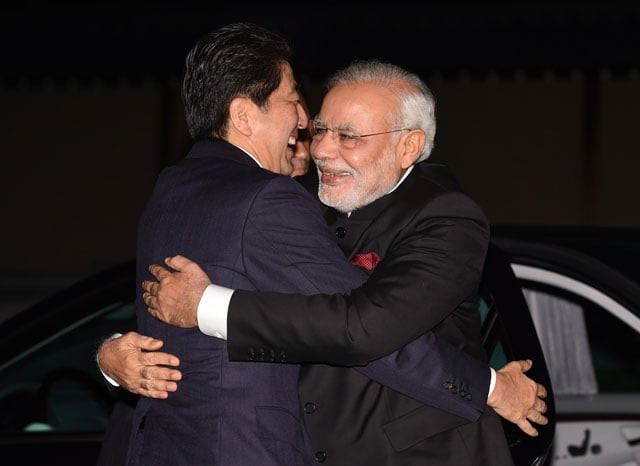India, Japan corner Islamabad over alleged 'cross-border terrorism'
2016’s joint statement had not named these groups explicitly even though it had called on Pakistan

In this photograph taken on August 30, 2014, India's Prime Minister Narendra Modi (R) is embraced by his Japanese counterpart Shinzo Abe upon his arrival at the State Guest House in Kyoto. PHOTO: AFP
The joint statement names Lashkar-e-Taiba (LeT) and Jaish-e-Mohammad (JeM) as terror groups. Addressing the issue of terrorism, the statement said that Modi and Abe looked forward to a fifth India-Japan Consultation on Terrorism, and strengthening cooperation against terrorist threats from groups including “al-Qaeda, Islamic State (IS), JeM, LeT, and their affiliates”, reported Times of India.
Terror threat in S Asia: Pakistan ‘shares BRICS nations concerns’
2016’s joint statement had not named these groups explicitly even though it had called on Pakistan to bring the perpetrators of terrorist attacks, including 26/11 Mumbai attacks and the 2016 Pathankot strike, to justice. However, it did underline the need for all countries to deal with “trans-national terrorism” emanating from their territory. 2017’s statement is much more direct, following the BRICS’ statement on terrorism.
India’s Foreign Secretary S Jaishankar said that the message to Pakistan was “quite clear” after the back-to-back Xiamen Declaration and the India-Japan statement. The naming of LeT and JeM by BRICS was seen as a significant achievement as China had, in 2016, blocked India’s move to include their names in the Goa Declaration.
Pakistan’s official response to the Xiamen Declaration showed that it is also concerned about the threat posed by terrorism and extremism in the South Asian region, but categorically denied housing any terrorist groups. In response to a question regarding the BRICS leaders’ summit document, the Foreign Office said: “Pakistan is also seriously concerned about the threat posed by terrorism and extremism in the South Asian region. Many terrorist groups based in the region, including in Afghanistan, such as the TTP and its associates like JuA have been responsible for extreme acts of violence against Pakistani people.”
“These organisations, they have some of their remnants in Pakistan, which we’re cleaning,” Pakistan’s Foreign minister insisted. “But as Pakistan, we reject this thing categorically, no terrorist organisation has any complete safe havens.”
Pakistan ‘disappointed’ by US reliance on ‘false narrative’
Last month, US President Donald Trump’s speech on Afghanistan policy also included Pakistan. Trump accused Pakistan of “housing the very terrorists that we [Americans] are fighting” in Afghanistan. He ignored the contributions and sacrifices Pakistan has made in fighting terrorism.
US President Donald Trump’s speech, which was peppered with vainglorious rhetoric and veiled threats, ‘disappointed’ Pakistan, which advised Washington to work with Islamabad “instead of relying on the false narrative of safe havens”. It is disappointing that the US policy statement ignores the enormous sacrifices rendered by the Pakistani nation in this effort,” Pakistan’s official response stated.
It also said Pakistan does not allow use of its territory against any country. “Instead of relying on the false narrative of safe havens, the US needs to work with Pakistan to eradicate terrorism.”



















COMMENTS
Comments are moderated and generally will be posted if they are on-topic and not abusive.
For more information, please see our Comments FAQ